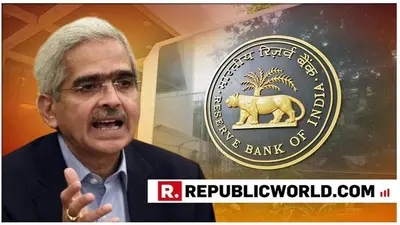Updated 11 June 2019 at 22:22 IST
RBI directs banks to withdraw NEFT and RTGS system charges with effect from July 1
In a move that will bring relief to end-users, the Reserve Bank of India (RBI) has directed all banks to cancel the National Electronic Funds Transfer (NEFT) and Real-time Gross Settlement (RTGS) charges with effect from July 1.
- India News
- 0 min read

In a move that will bring relief to end-users, the Reserve Bank of India (RBI) has directed all banks to cancel the National Electronic Funds Transfer (NEFT) and Real-time Gross Settlement (RTGS) charges with effect from July 1.
The RBI Governor, Shaktikanta Das, had announced the decision at the central bank's third bi-monthly monetary policy review of 2019, in which the big decision was the key repo rate being cut by 25 basis points to 5.75 percent - the third consecutive cut in as many reviews.
In addition, the RBI changed its monetary policy stance to 'accommodative' from the earlier 'neutral' - further signalling its intent - while the GDP projection was adjusted from 7.2 percent to 7.0 percent for the ongoing fiscal. Meanwhile, the inflation outlook was somewhere around 3.0 percent to 3.1 percent in the first quarter of 2019-20 and 3.7 percent to 3.9 percent in the second quarter.
Prior to this, the RBI had ordered banks to levy a service charge on the fund transfer which included the RTGS. A charge of not more than Rs 30 was levied for transactions which summed up to Rs 2,00,000 to Rs 5,00,000. Whereas, for transactions above Rs 5,00,000 the maximum charge was Rs 55. Banks across the country were allowed to charge a lower rate but exceeding the rate was not allowed by the RBI.
Advertisement
NEFT can be used to transact amounts between Rs 10,000 up to Rs 2,00,000, for which the charges levied range from Rs 2.50 to Rs 25 for amounts ranging from Rs 10,000 to Rs 2,00,000 respectively.
With this decision, the customers can now choose to avail these services without paying a surcharge. The changes have been carried out to provide an impetus to digital banking.
Advertisement
A committee will be set up by the RBI which shall involve all stakeholders, under the chairmanship of CEO Indian Banks’ Association (IBA), to examine the entire gamut of ATM charges and fees. The Committee is expected to submit its recommendations within two months of its first meeting.
Published By : Digital Desk
Published On: 11 June 2019 at 21:32 IST
